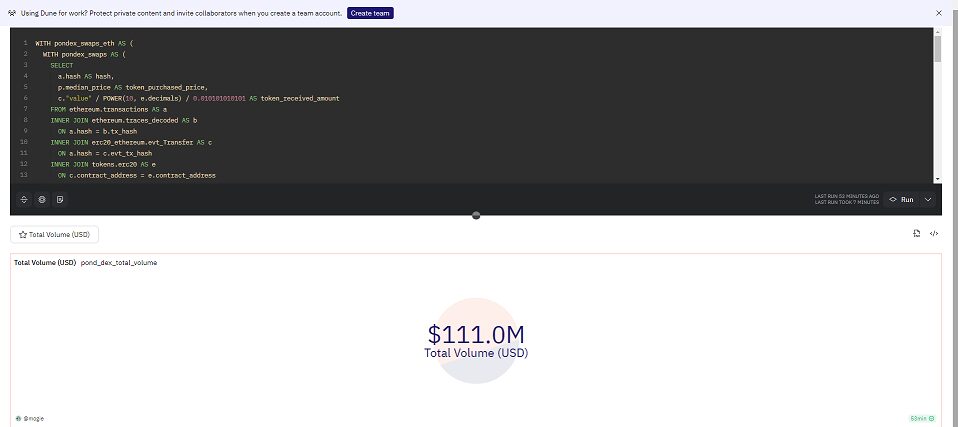The Pond0X decentralized exchange (DEX) has reached more than $100 million in total trading volume, according to a September 28 social media post from its official channel. Investors previously lost over $2 million in the launch of the exchange’s native token, PNDX, when the coin turned out to have a transfer function that allowed anyone to transfer it without the owner’s permission. But supporters claim these losses were not the fault of the developer.
$108,000,000 Trade Volume ✅
And counting.
What comes next…?
— Pond Coin (@Pond0x) September 28, 2023
As evidence for Pond0X DEX’s trading volume, the official channel cited a Dune dashboard created by user mogie, which shows over $111 million in all-time trading volume as of September 29.
The PNDX token launched on July 28. At the time, critics accused the project of being a “rug-pull” or exit scam. At issue was the unorthodox way that the project’s founder, Jeremy Cahen (also known as “Pauly”), launched the coin. In the launch post on X (formerly Twitter), Cahen posted the URL to an app that allowed people to deposit a fixed amount of Ether (ETH) to receive a fixed amount of PNDX. He also posted the contract address for the token.
In response, some investors started buying the coin on Uniswap, using its contract address to identify it, while others deposited ETH into the app to receive PNDX. The price on Uniswap quickly rose above that of the ETH needed to mint PNDX, so minters started selling their coins into the market at a profit. Critics claimed that this process transferred over $2 million of wealth from those who bought the coin on Uniswap to those who minted it using the app. The ETH deposited through the app went into a contract that contained no means of reclaiming the funds, leading critics to allege that the whole project was intended to drain funds from investors and send it to Cahen.
In addition, coding experts began claiming that the token lacked a normal transfer function. Instead of only allowing the token owner to transfer it, PNDX allowed anyone to transfer tokens. This meant that each PNDX owner could lose their tokens at any moment, since any programmer could “steal” their PNDX using developer tools. On July 29, Solidity enthusiast and blogger sm-stack claimed they ran a test in Foundry that proved this point.
However, more than two months after the project’s launch, it…
Click Here to Read the Full Original Article at Cointelegraph.com News…
























